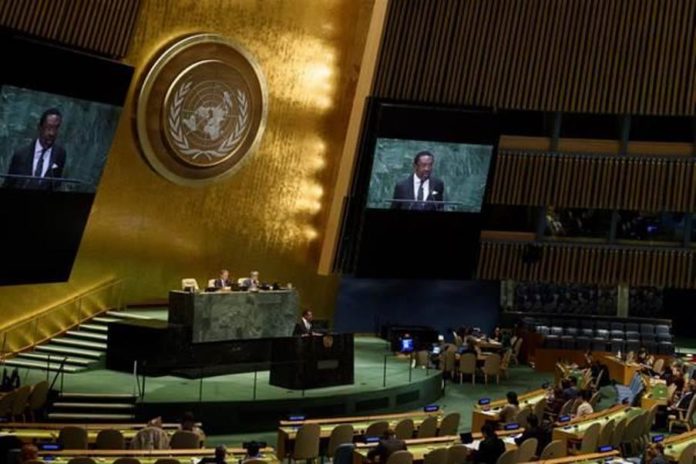The President of the International Criminal Court, Judge Chile Eboe-Osuji, has concluded an official mission to the seat of the United Nations (UN) in New York. During his visit, which lasted from Monday, 29 October until Thursday 1 November 2018, President Eboe-Osuji addressed the UN General Assembly to present the Court’s annual report to the United Nations. He also held a number of meetings with representatives of States and officials of the United Nations, and gave a lecture at the Columbia Law School.
In his address to the UN General Assembly, as well as in his many meetings, President Eboe-Osuji underlined the need for continued support and commitment to the Court. “It is both necessary and possible to strengthen the ICC. For, that is to strengthen the wall of conscience and of international law against ‘unimaginable atrocities that deeply shock the conscience of humanity’”, he told the General Assembly. He argued that the Court is today as necessary as it was at the adoption of its founding treaty 20 years ago, particularly taking into account the number of armed conflicts in the world, which often bring atrocity crimes with them. “It is in this respect that the objectives of the United Nations and the ICC remain unsurprisingly at one. They commonly involve the global project to protect peace and security and human rights, through multilateral cooperation and action, backed by the international rule of law,” President Eboe-Osuji stated.
In his remarks, the Court President emphasised that the ICC does not undermine national sovereignty. “Under the Rome Statute, the primary jurisdiction belongs to the State with the closest sovereign connection to the situation under consideration. It is only when that State proves unable or unwilling to do justice in the exercise of that primary jurisdiction that the ICC is legally entitled to intervene. The essence of the doctrine of complementarity, then, is that justice must not suffer the fate of the neglected orphan in the province of sovereignty of nations.” President Eboe-Osuji also referred to the Court’s intensive investigative and judicial activities during the past year, including increasingly in proceedings relating to reparation of victims, as detailed in the Court’s written annual report. During his visit, the Court President met with a number of senior United Nations officials, including the President of the UN General Assembly, H.E. María Fernanda Espinosa Garcés. He briefed the New York Working Group of the Bureau of the Assembly of States Parties to the Rome Statute, met with several regional groups of States and held talks bilaterally with several permanent representatives to the UN from States Parties as well as States not party to the Rome Statute. These meetings provided opportunities for highly constructive discussions on the Court’s current activities as well as on efforts to strengthen cooperation in the international efforts for accountability and increase the participation of States in the Rome Statute system.
Public Affairs Unit, ICC

















